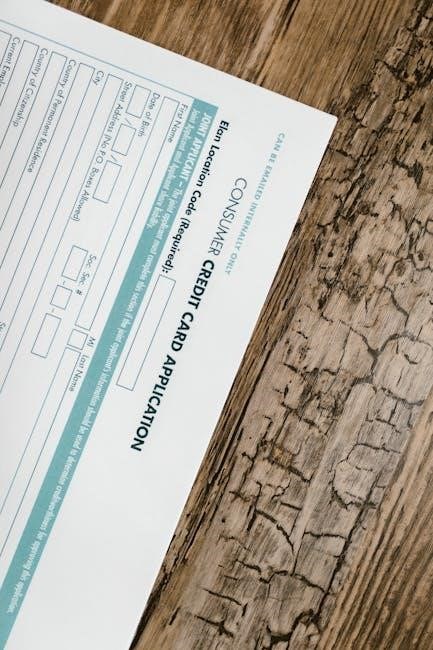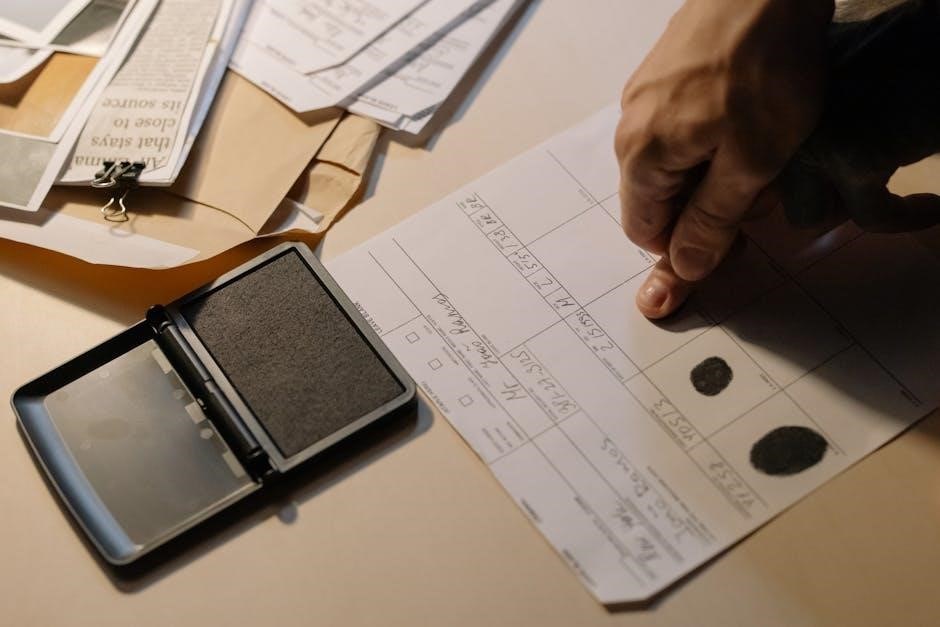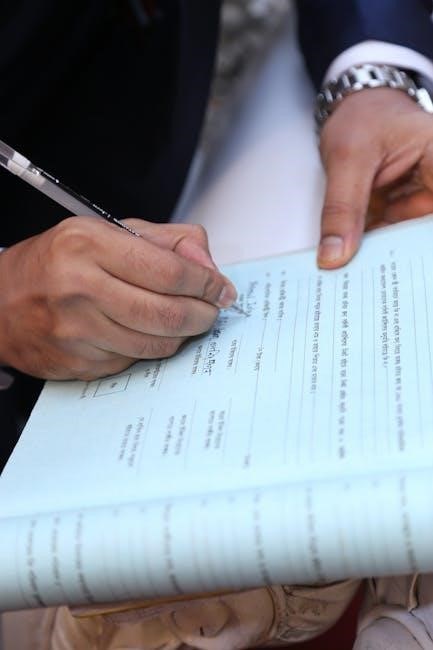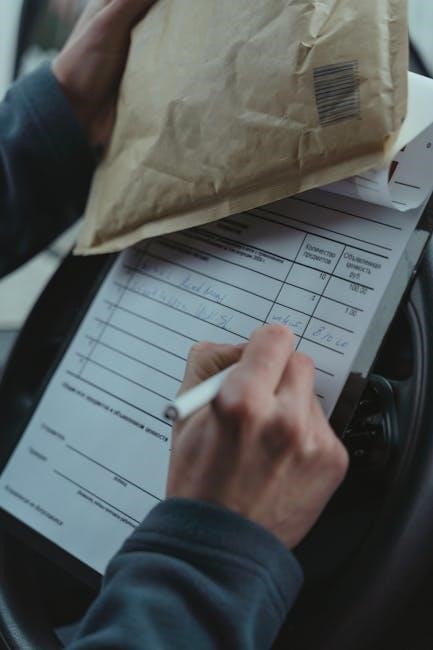The RCMP Criminal Record Check is a vital process for background screening. The C-216 form, available as a fillable PDF, is essential for initiating the check. Compatible with Adobe Reader 9+, it ensures efficient processing of criminal history information.
What is an RCMP Criminal Record Check?
An RCMP Criminal Record Check verifies an individual’s criminal history in Canada. It involves submitting fingerprints on a C-216 form, which is processed by the RCMP. The check is essential for employment, immigration, or other legal purposes. The C-216 form is a standardized document used to capture personal details and fingerprint samples. Once processed, the RCMP provides a report detailing any criminal convictions or pending charges. This process ensures transparency and security for individuals and organizations requiring background checks.
Why is an RCMP Criminal Record Check Necessary?
An RCMP Criminal Record Check is essential for ensuring public safety and trust. It helps employers, organizations, and immigration authorities verify an individual’s background; The check reveals criminal convictions, enabling informed decisions about hiring, volunteering, or granting access to sensitive roles. It also supports legal requirements for vulnerable sector screenings, protecting at-risk populations. By providing a detailed report, the RCMP check ensures transparency and accountability, making it a critical tool for maintaining security and integrity in various sectors.

Obtaining the RCMP Criminal Record Check Form
The RCMP Criminal Record Check Form (C-216) is readily available online as a fillable PDF. Download it using Adobe Reader 9+ for compatibility. Accredited agencies can assist with form submission and fingerprinting, ensuring a smooth process for applicants.
How to Download the RCMP C-216 Form in PDF
The RCMP C-216 form can be downloaded directly from the RCMP’s official website. Ensure you have Adobe Reader 9 or higher installed for compatibility. Visit the RCMP portal, locate the C-216 form link, and save it to your device. Open the form in Adobe Reader to fill it out digitally. Remember to save your progress regularly. For optimal functionality, avoid using other PDF viewers or mobile devices, as they may not support all features. Always verify the form’s authenticity by cross-checking it with the RCMP’s official resources.
Steps to Fill Out the RCMP Criminal Record Check Form
Begin by downloading the RCMP C-216 form from the official website using Adobe Reader 9+. Carefully read all instructions before starting. Fill in personal details, including your full name, date of birth, and contact information. Ensure all fields marked as mandatory are completed accurately. Avoid using abbreviations or nicknames. Review the form for any errors or omissions. Sign and date the form where required. Once completed, save the form and print it for submission. Double-check all information for accuracy before finalizing.
Eligibility Criteria for Submitting the Form
To submit the RCMP Criminal Record Check Form, applicants must meet specific eligibility criteria. The form is intended for individuals requiring a criminal record check for employment, volunteering, or other official purposes. Applicants must be at least 12 years old, with parental consent required for minors under 18. The form must be filled out accurately and completely, with all mandatory fields addressed. Proper identification is essential, and submissions must be made through accredited agencies or police services. International applicants may need to meet additional requirements, such as using digital fingerprinting services. Ensure compliance with all guidelines before submission.

Understanding the RCMP C-216 Form
The RCMP C-216 form is a critical document for initiating criminal record checks. It is designed as a fillable and savable PDF, ensuring ease of use. The form must be completed accurately, with all mandatory fields filled out. It is compatible with Adobe Reader 9 and higher, though functionality may vary on other devices. The C-216 form is essential for individuals and organizations requiring background checks. Proper completion and submission are vital for processing criminal record checks efficiently.
Structure and Key Sections of the RCMP C-216 Form
The RCMP C-216 form is structured to collect essential personal and biometric data for criminal record checks. Key sections include personal details, birthdate, and signature. A barcode is generated for efficient processing. The form must be printed on specific paper and filled accurately to avoid delays. It is used for both individual and organizational background checks, ensuring compliance with RCMP requirements. Proper completion of all fields is crucial for timely and accurate processing of criminal record checks.
Importance of Fingerprint Submission
Fingerprint submission is critical for RCMP criminal record checks, as it ensures accurate identification and verification. Fingerprints are unique biometric data, reducing errors and enhancing the reliability of the background check process. They are required for both domestic and international applications, ensuring compliance with legal standards. Properly taken fingerprints prevent delays and facilitate efficient processing. Accredited agencies provide guidance to ensure high-quality samples, making fingerprint submission a cornerstone of the RCMP criminal record check system.
How to Ensure Accuracy in the Form
To ensure accuracy in the RCMP Criminal Record Check form, download the latest version of Adobe Reader for compatibility. Fill out the form on a computer for clarity, avoiding handwritten errors. Review all fields carefully, ensuring personal details match official documents. Refer to the Fingerprint Sample provided to guarantee proper fingerprint placement. Double-check all information before submission and use black ink for signatures. For fingerprints, consider professional services from accredited agencies to maintain quality and avoid processing delays.

Fingerprinting for RCMP Criminal Record Check
Fingerprinting is essential for RCMP Criminal Record Checks, ensuring accurate identity verification and aiding in thorough background investigations. It is a critical step in the process.
Where to Get Fingerprints Taken
Fingerprints for RCMP Criminal Record Checks can be taken at local police departments, RCMP detachments, or accredited fingerprinting agencies. These locations provide the necessary equipment and expertise to capture high-quality prints. Digital fingerprinting services are also available, offering convenience and faster processing. Ensure the chosen service uses RCMP-approved methods and submits prints on official C-216 forms. This step is crucial for accurate and efficient background checks.
Guidelines for Submitting Fingerprint Samples
When submitting fingerprint samples for an RCMP Criminal Record Check, ensure they meet specific standards. Prints must be clear and taken on official C-216 forms. Avoid smudging or over-inking, as this can delay processing. Digital submissions are preferred for accuracy and speed. Always use RCMP-accredited agencies to guarantee compliance with formatting and quality requirements. Properly fill out all sections of the form and attach the fingerprint sample securely. This ensures smooth processing and minimizes the risk of rejection or delays.
Role of Accredited Fingerprinting Agencies
Accredited fingerprinting agencies play a crucial role in ensuring the accuracy and quality of fingerprint submissions for RCMP Criminal Record Checks. They electronically capture fingerprints and print them on official C-216 forms, adhering to RCMP standards. These agencies verify identity, ensure proper formatting, and assist with digitizing prints for international submissions. They also handle special requirements, such as printing on specific paper for international use. By using accredited agencies, applicants can ensure compliance with RCMP guidelines, reducing errors and processing delays. Their expertise guarantees that fingerprint samples meet the necessary quality standards for accurate background checks.
Submitting the RCMP Criminal Record Check Form
The RCMP Criminal Record Check form must be submitted with required documentation and fees. Ensure all sections are filled accurately to avoid delays in processing.
Methods to Submit the Completed Form
Completed RCMP Criminal Record Check forms can be submitted by mail or through accredited fingerprinting agencies. Mailing requires sending the form and fingerprints to the RCMP headquarters in Ottawa. Accredited agencies can digitize fingerprints and submit them electronically, expediting the process. Ensure all sections are filled accurately and required documents are included. Processing times vary, so plan accordingly. Digital submissions are preferred for faster turnaround. Always verify the mailing address and submission guidelines to avoid delays.
Required Documentation Alongside the Form
When submitting the RCMP Criminal Record Check form, include a completed C-216C fingerprint form and valid government-issued ID. Ensure fingerprints are taken by an accredited agency or police station. Attach any additional documents required for specific checks, such as a Vulnerable Sector Screening. Include payment details as specified. Ensure all information is accurate to prevent processing delays. Follow submission guidelines carefully to ensure completeness and compliance with RCMP requirements.
Processing Time for RCMP Criminal Record Checks
Processing times for RCMP Criminal Record Checks vary depending on the submission method and complexity. Digital submissions typically process faster, within 3-5 business days, while paper-based forms may take up to 120 days. International applications often require additional time due to shipping and verification processes. Delays may occur with incomplete forms or high volumes of requests. Applicants can check the status of their request online or through the RCMP’s customer service. Ensuring accurate and complete submissions helps expedite the process.

Types of RCMP Criminal Record Checks
The RCMP offers Standard Criminal Record Checks, Vulnerable Sector Checks, and International Criminal Record Checks. Each serves different purposes, ensuring background screening meets specific requirements.
Standard Criminal Record Check
A Standard Criminal Record Check verifies an individual’s criminal history in Canada. It uses the C-216 form, which is fillable and savable in PDF format with Adobe Reader 9+. The check includes charges, convictions, and absolute discharges. Processing typically takes 3-6 months. It’s commonly required for employment, licensing, or volunteer work. The form must be submitted with fingerprints, either digitally or on paper, to the RCMP. Ensure accuracy to avoid delays. This check is essential for assessing suitability for various roles and responsibilities.
Vulnerable Sector Check
A Vulnerable Sector Check is an enhanced screening required for roles involving children, elderly, or disabled individuals. It uses the C-216 form, available as a fillable PDF. This check includes criminal convictions, charges, and absolute discharges, plus additional searches for pardoned offenses. Fingerprint submission is mandatory. Processing times vary but typically take several months. Ensure all information is accurate to avoid delays. This check is crucial for ensuring safety in sensitive roles and is often mandated by Canadian legislation and organizational policies.
International Criminal Record Checks
International Criminal Record Checks are essential for individuals outside Canada requiring RCMP verification. The C-216 form, available as a fillable PDF, is used for this process. Applicants must submit fingerprints, which are digitized and printed on official C-216 paper. Accredited agencies assist with fingerprinting, ensuring compatibility with RCMP standards. The completed form is mailed to the RCMP for processing. Special requirements apply, including accurate personal details and adherence to submission guidelines. This process is crucial for international applicants seeking Canadian criminal record verification for employment, immigration, or other purposes.
RCMP Criminal Record Check Fees and Payment
The RCMP criminal record check involves specific fees, which can be paid via accepted methods. The cost varies based on the type of check and services required. Additional fees may apply for fingerprint digitization and expedited processing. Payment methods include credit cards and certified cheques. Fee remission options are available under certain conditions, ensuring accessibility for all applicants. It’s important to review the payment guidelines thoroughly to avoid delays in processing.
Cost of RCMP Criminal Record Check
The RCMP criminal record check typically costs $25 for a standard check and $45 for a vulnerable sector check. Additional fees may apply for fingerprinting services, which can range from $30 to $75, depending on the agency. Payment methods include credit cards or certified cheques. Fee remission options are available under specific circumstances. It’s essential to verify the current fees on the RCMP’s official website or consult an accredited agency to ensure accurate payment processing.
Payment Methods Accepted by RCMP
The RCMP accepts various payment methods for criminal record checks, including credit cards (e.g., Visa, Mastercard) and certified cheques. Payments must be made in Canadian dollars and are non-refundable once processed. For online submissions, digital payment gateways are available for convenience. Ensure the payment method aligns with the RCMP’s guidelines, as outlined on their official website. Always verify the most current payment options before submitting your application to avoid delays.
Fee Remission Options
The RCMP offers fee remission options for individuals who meet specific eligibility criteria. These options are designed to reduce financial barriers for those requiring criminal record checks. Typically, remissions are granted under special circumstances, such as financial hardship or when the check is mandated for volunteer or community service purposes. Applicants must provide supporting documentation to qualify. For detailed eligibility and application processes, refer to the RCMP’s official guidelines or consult their customer service team directly.

RCMP Criminal Record Check for International Applicants
International applicants must submit fingerprints on the C-216 form, digitized for RCMP processing. Additional documentation and fee requirements apply, with specific instructions for non-Canadian residents.
Steps for Applying from Outside Canada
International applicants must download the C-216 form, fill it out, and have fingerprints taken by an accredited agency. Ensure the form is completed accurately, including name, DOB, and other details. Fingerprints must be digitized and submitted on the C-216C form. Attach required identification and fees. Submit the form to the RCMP via mail or authorized agencies. Processing times vary, so plan accordingly. Ensure all documents comply with RCMP requirements for international submissions.
Special Requirements for International Submissions
For international applicants, fingerprints must be taken by an accredited agency and submitted on the C-216C form. The form must be printed on specialized paper and include a barcode. Ensure all sections are filled accurately, and attach required identification. Digitized fingerprints are preferred for faster processing. Additional documentation may be needed, and fees must be paid in Canadian dollars. Submit the form to the RCMP via mail or through an authorized agency. Processing times may be longer due to international shipping and verification procedures.
Digitizing Fingerprints for RCMP Submission
Digitizing fingerprints for RCMP submission involves capturing them electronically and transferring them to the C-216 form. Accredited agencies use specialized software to ensure high-quality images. The fingerprints are then printed on official C-216C paper, which includes a barcode for efficient processing. International applicants must ensure their fingerprints are taken by authorized agencies to meet RCMP standards. Digital submissions are preferred for faster processing, and the form must be filled accurately to avoid delays. Always verify the latest RCMP guidelines for any updates on digital fingerprinting requirements.

Common Issues and Solutions
Common issues include form incompatibility with non-Adobe PDF viewers, incomplete submissions, and poor fingerprint quality. Solutions involve using Adobe Reader, ensuring all fields are filled, and verifying fingerprint clarity before submission.
Errors in Filling Out the Form
Common errors include incomplete or inaccurate personal information, improper formatting, and missing signatures. Ensure all fields are filled correctly, and avoid alterations. Use Adobe Reader 9+ for compatibility. Verify name, DOB, and contact details. Avoid using incorrect versions of the form. Double-check fingerprint placement and clarity. Incomplete submissions may delay processing. Ensure the form is signed and dated properly. Use black ink for clarity. Avoid folding or damaging the form, as this can prevent proper scanning. Ensure all sections are legible and accurately completed to prevent rejection or delays.
Delays in Processing Criminal Record Checks
Delays often occur due to incomplete or inaccurate forms, high volumes of requests, or manual reviews. Errors in fingerprint submission or form completion can slow processing. Peak periods and COVID-19-related disruptions have also extended wait times. Ensure all details are correct to avoid hold-ups. Processing times may vary, so plan accordingly. Submitting forms during off-peak times can help reduce delays. Always verify the accuracy of your submission to prevent additional wait times. Proper preparation is key to timely processing of your criminal record check.
Lost or Missing RCMP Criminal Record Check Results
If your RCMP Criminal Record Check results are lost or missing, contact the RCMP support team immediately. Provide your reference number and submission details for verification. In some cases, resubmission of the C-216 form may be required. Ensure all personal information matches the original submission to avoid further delays. Lost results can be reissued if verified by the RCMP. Keep a copy of your form and submission confirmation for tracking purposes. Timely follow-up is crucial to resolve such issues efficiently.

Security and Privacy of RCMP Criminal Record Checks
The RCMP ensures personal information is protected under strict privacy laws. Secure submission methods are used to safeguard data, and forms are encrypted to prevent unauthorized access.
How RCMP Protects Personal Information
The RCMP prioritizes the security of personal information through robust measures. All data collected for criminal record checks is encrypted and stored securely. Access is restricted to authorized personnel only. The RCMP complies with federal privacy laws, ensuring confidentiality throughout the process. Physical documents, like the C-216 form, are handled securely, and digital submissions are protected by advanced cybersecurity systems. This ensures that sensitive information remains safeguarded from unauthorized access or breaches.
Privacy Laws Governing Criminal Record Checks
RCMP criminal record checks are governed by strict privacy laws, including the Personal Information Protection and Electronic Documents Act (PIPEDA) and the Privacy Act. These laws ensure that personal information collected during the process is handled confidentially and securely. The RCMP is required to obtain consent before disclosing any criminal record information. All data is protected from unauthorized access, and individuals have the right to request access to their own records. These laws ensure transparency and accountability in the criminal record check process.
Secure Submission Methods for the Form
The RCMP ensures secure submission methods for the C-216 form to protect personal information. Completed forms can be submitted via mail to the RCMP’s Identification Services in Ottawa or through accredited fingerprinting agencies. Digital fingerprinting services also allow for secure electronic submission. All data is encrypted and stored on secure servers to prevent unauthorized access. Additionally, the RCMP recommends using trackable mail services to ensure the form reaches its destination safely. These measures guarantee the confidentiality and integrity of the submission process.

Recent Updates and Changes
The RCMP updated its criminal record check process in 2015, altering how checks are conducted; This change impacted Health Canada’s ability to perform criminal record checks independently.
2023 Updates to RCMP Criminal Record Check Process
In 2023, the RCMP introduced enhanced digital fingerprinting processes, streamlining criminal record checks. These updates improved efficiency and reduced processing times, ensuring faster results for applicants. The integration of digital systems allows for better accuracy and security in handling personal information. Additionally, the RCMP emphasized the importance of using Adobe Reader 9+ for fillable PDF forms, ensuring compatibility and ease of use for individuals submitting applications.
Impact of Digital Fingerprinting on the Process
Digital fingerprinting has significantly streamlined the RCMP criminal record check process, enhancing efficiency and accuracy. By capturing fingerprints electronically, the need for manual ink-based prints is reduced, minimizing errors. The digital process integrates seamlessly with the C-216C form, allowing for faster submission and processing times. This advancement also supports international applications, as digital prints can be easily submitted and processed regardless of location, ensuring a more accessible and modern approach to criminal record checks.
COVID-19 Related Changes to RCMP Services
During the COVID-19 pandemic, the RCMP implemented several changes to ensure continuity of services. The front counter services were modified to prioritize essential criminal record checks, though vulnerable sector checks were temporarily limited. Digital fingerprinting became more prominent to reduce in-person visits, aligning with public health guidelines. The RCMP also emphasized the use of online platforms for form submissions and processing, enhancing efficiency and safety for applicants and staff alike during this challenging period.

Additional Resources and Help
Visit the RCMP’s official website for detailed guides, FAQs, and contact information. Access downloadable forms and instructions for criminal record checks, ensuring a smooth application process.
RCMP Official Website and Contact Information
The RCMP provides comprehensive resources on their official website, including downloadable forms, FAQs, and detailed instructions. Visit https://www.rcmp-grc.gc.ca/ for guides on criminal record checks. Contact their support team for assistance with form submissions or processing. The RCMP headquarters is located at 1200 Vanier Parkway, Ottawa, ON K1A 0R2. Utilize their official channels for accurate and secure processing of your criminal record check application.
Frequently Asked Questions About the Form
Common questions about the RCMP C-216 form include its purpose, required fields, and submission methods. The form is used for criminal record checks and must be filled accurately. Ensure compatibility with Adobe Reader 9+ for digital completion. Find detailed instructions and FAQs on the RCMP website. Properly filled forms ensure timely processing, while errors may cause delays. Accredited agencies can assist with fingerprinting, and digital submission options are available for convenience.
Alternative Methods for Criminal Record Checks
Alternative methods for RCMP criminal record checks include digital fingerprinting and third-party accredited agencies. These services streamline the process by capturing fingerprints electronically and submitting them directly to the RCMP. Digital solutions reduce errors and expedite processing times. For international applicants, fingerprinting agencies can digitize prints onto the C-216 form. Online submissions through secure portals are also available, ensuring convenience and efficiency. These alternatives aim to simplify the process while maintaining the integrity of the criminal record check system.
The RCMP Criminal Record Check is a crucial process for verifying an individual’s criminal history. Ensure accuracy and efficiency by following RCMP guidelines and using the C-216 form correctly.
Final Tips for Completing the RCMP Criminal Record Check Form
Ensure all fields are filled accurately and completely. Use Adobe Reader 9+ for compatibility. Double-check personal details and fingerprints. Submit the form with required documents. Plan for processing times, which may vary. Follow RCMP guidelines strictly for a smooth process. Contact support if issues arise. Proper submission ensures timely results. Remember, accuracy and adherence to instructions are crucial for successful completion.
Importance of Adhering to RCMP Guidelines
Adhering to RCMP guidelines ensures accuracy and efficiency in processing. Properly filled forms and correct fingerprint submissions prevent delays. Compliance with requirements avoids rejections or additional steps. Following instructions helps maintain the integrity of the criminal record check. Timely and accurate results depend on strict adherence to provided protocols. This attention to detail ensures the process runs smoothly and meets all necessary standards set by the RCMP. It is crucial for both individuals and organizations to follow these guidelines carefully.

Be First to Comment